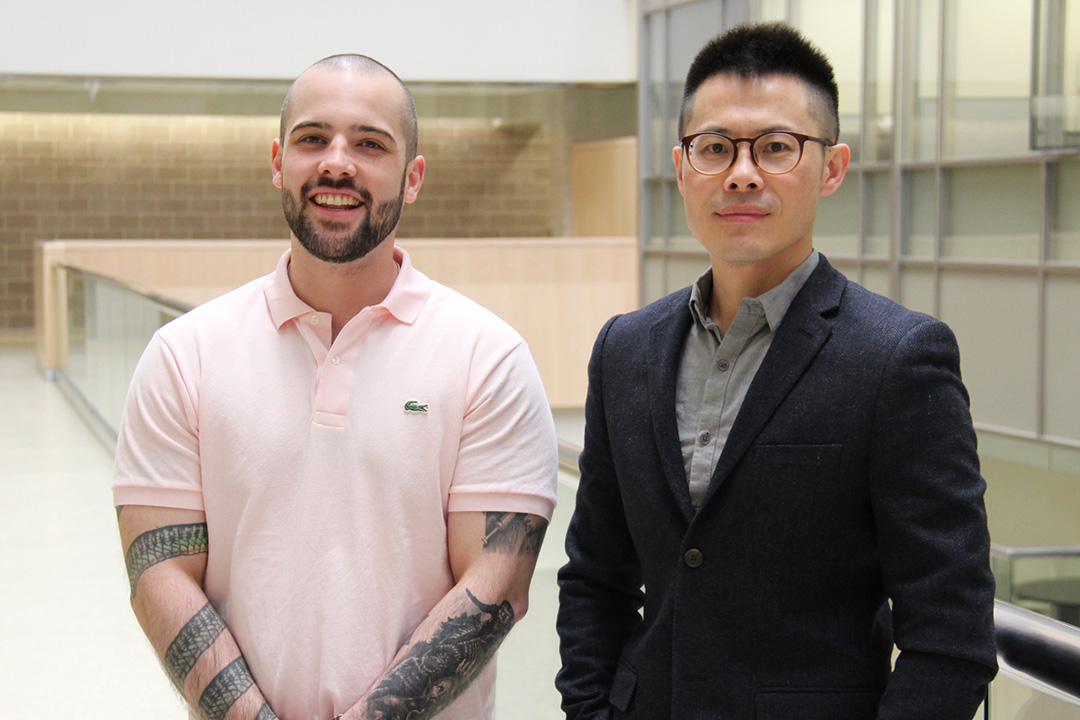
USask researchers visit Parliament to highlight need for more cannabis research
Two researchers from the University of Saskatchewan were in Ottawa recently to help inform policymaking related to medical cannabis use and veterans.
By Sarah VermetteJacob Cohen, M.Sc. student in the Department of Pharmacology and Psychiatry, and Dr. Yanbo Zhang, Assistant Professor in the Department of Psychiatry, delivered testimony in the House of Commons to the Standing Committee of Veteran's Affairs Inquiry into Medical Cannabis and Veterans' Well-Being on November 22, 2018.
This opportunity came about when Cohen met Dr. Robert Kitchen, MP-Saskatchewan at the Canadian Institute for Military & Veteran Health Research conference. After learning of Cohen’s background as a former civilian paramedic and honourably discharged combat medic in the Israeli Defense Forces, Kitchen invited Cohen, and his supervisor, Dr. Yanbo Zhang to deliver testimony. Dr. Robert Laprairie from the College of Pharmacy was also invited but unable to attend.
“This was a wonderful opportunity,” said Zhang, who offers credit for the opportunity to Cohen, a veteran and currently a student researching cannabis, for being willing to actively reach out and talk about it.
“We simply have not enough high-quality research to support or against cannabis’s medical potential in treating psychiatric disorders. Traditionally, scientific societies had a negative attitude to cannabis, which means the majority of supported studies have been aimed to prove the negative aspects,” said Zhang. In his testimony, Cohen noted many studies contradict each other. The reasoning for this is studies in this field are quite biased, being either for or against.
From psychiatrists’ perspective, whose modus operandi is to “do no harm,” more research is required to gain a comprehensive understanding of the medicinal uses of cannabis. Various factors need to be studied, such as: what quantities are beneficial without being harmful (those who struggle with mental health issues may be more prone to having psychosis exacerbated by THC); differing treatments for various ailments (a person dealing with physical pain may require higher or more regular dosing to gain relief); tolerance thresholds and whether this changes across duration of use, and much more.
“We do not have enough research, which tells us whether it really works or not,” said Zhang.
Cannabis is an anomaly in the medical world as it’s not controlled like any other prescription drugs. Both Zhang and Cohen expressed the importance of education for physicians, who can authorize the purchase of medicinal marijuana for their patients, without the research to inform how cannabis impacts various factors, such as pregnancy, and long-term effects on mental health and physical health.
“We need a well-informed system for the authorizations, and to properly monitor the use,” said Cohen.
Cohen hopes to see better education for cannabis at all levels, from the public to educational institutions. This area is still riddled with bias and stigma, and as research contributes an evidence-based understanding, society will be enabled to move beyond those belief systems that don’t hold true, and medical practitioners will be enabled to practice evidence-based care.
From the perspective of a veteran, Cohen would specifically like to see more informed and unbiased information about cannabis being given during the military discharge process, to offer a non-judgmental option to the vets who require the use of cannabis for relief of various ailments.
With legalization, research is now starting to blow up due to need and recent discoveries such as CBD oil for the aggressive Dravet’s Syndrome epilepsy. “It’s a hot spot for researchers. Canada now has the opportunity to be a leader in the field,” notes Zhang. He hopes to see government embrace the opportunity to support objective studies.
“Researchers in this field tend to be really young, or ‘trail blazers’, and are open to sharing information and collaborating,” noted Cohen.
Their full testimonies, including the Q & A, can be found at www.ourcommons.ca.
Article re-posted on .
View original article.

